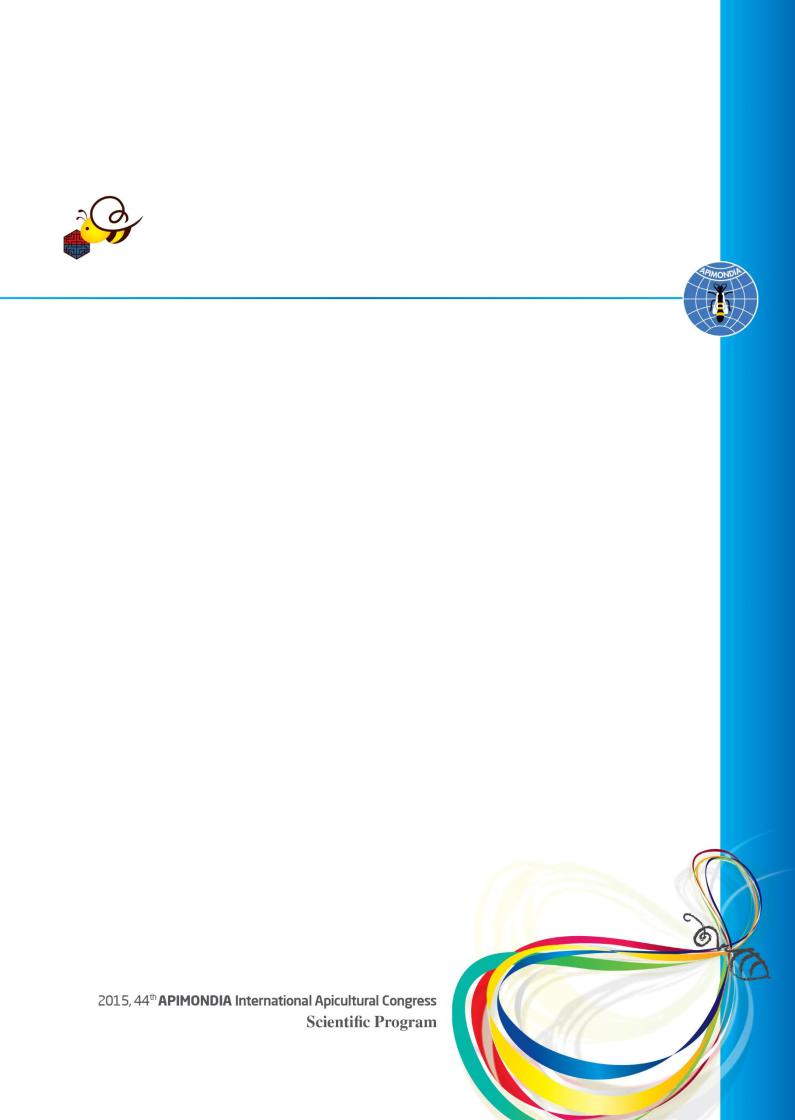
Apimondia 2015 Abstract book (South Korea)
.pdfPlenary Lecture |
Exhibition Hall, Thursday, 17 September |
|
|
Pollination and food security: win-win scenarios between pollinator diversity and crop yield for smallholdings worldwide
Lucas Alejandro Garibaldi
Sede Andina, Universidad Nacional de Río Negro, Argentina
A spouse indicated the marriage partner, he or she called “our wife or our husband”, not “my wife or my husband,”
Closing gaps in crop yield while enhancing sustainability is among the greatest challenges for achieving food security. Ecological intensification, the improvement of crop yield through ecosystem services provided by biodiversity, may be a sustainable pathway. However, data supporting such an approach are missing, especially for two billion smallholders, many of which are undernourished. Despite fruit or seed set of many crops relies on pollinators, management for improved pollination services is uncommon, likely contributing to yield gaps globally. Indeed, pollination has been neglected even in the studies analyzing the continental or global drivers of yield gaps. Pollinator deficits may be more significant than before, as (i) other resources (e.g. nutrients) are increasingly provided (e.g. fertilizers) to crops, (ii) cultivated area of pollinator-dependent crops is expanding more rapidly than the area of pollinator-independent crops, (iii) cultivated area of pollinator-dependent crops is also expanding more rapidly than the stock of managed honey bee colonies, and (iv) wild populations of pollinators are increasingly threatened. Furthermore, pollinator-dependent crops provide essential micronutrients to humans in those regions of the world where micronutrient deficiencies are common. To date, it is uncertain to what degree local populations of pollinators need to be enhanced (“flower-visitor gap”), and how much of the yield gaps (kg ha-1) can be closed by such management. Using the same coordinated protocol, we quantified to what degree enhancing flower-visitor density can close yield gaps on 344 fields from 33 pollinator-dependent crop systems in smalland large-holdings from Africa, Asia, and Latin America. For <2ha holdings, we found that yield gaps could be closed by a median of 24% through higher flower-visitor density. For larger holdings, such level of yield benefits only occurred if they sustained high flower-visitor richness. Therefore, biodiversity can compensate the negative effects of field size. Worldwide, our study demonstrates that ecological intensification can create winwin scenarios between biodiversity and crop yield.
20
Plenary Lecture |
Exhibition Hall, Friday, 18 September |
|
|
Perspectives in traditional ecology and landscapes of Korea
Dowon Lee, Yoori Cho
Department of Environmental Planning, Graduate School of Environmental Studies
Seoul National University, Republic of Korea
A spouse indicated the marriage partner, he or she called “our wife or our husband”, not “my wife or my husband,” in the traditional societies of Korea. The nomen keeps even in contemporary Korean societies, although it sounds strange. The unique nomen may be associated with Korean peoples’ perspectives, which were derived from experiences undergone with nature and culture in the long history. In this lecture, the perspective is called “weperspective” and related to concepts of watershed and hierarchy embedded in Korean traditional knowledge and managed landscapes. Divides of watersheds are identified in many relevant maps and historical documents, including an old map which was drawn in 1402 and is currently kept in a library of Ryukoku University, Japan. Furthermore, old documents and remaining traditional villages show that in the past, Koreans preferred to locate a village nested within a watershed, enclosed by mountain ranges. In particular, they sought for a watershed, the mouth of which is well closed or narrow. They used to cover the mouth of village watershed by nurturing a grove when it was open. The preference might be related to life and culture, which relied on rice paddies that require a lot of water supply. We will discuss how well water was conserved in cropland adjacent to the village. Frequently, the enclosure of watershed was called wul, which means “fence”. It seems that the group of people who lived inside wul was called wuri, which means ‘we’ in English. Hierarchy concept seems to be intimately related to human genealogy. It is unknown when Koreans began writing family trees, but a comprehensive genealogy of mountains was compiled in the 18th century. In the genealogy of mountains, high peaks and major mountain ranges of Korea were arranged in the way as they recorded family trees of humans. Interestingly, combining ideas of watershed and hierarchy is exemplified in a map, Daedongyeojido which was carved by Jungho Kim in 1861, referring to the genealogy of mountains. We-perspective may be good and bad from time to time. New perspective seems to be complemented by experiences of bee-farming, which will be proposed in our presentation.
21
22

Scientific Program by Commission
Scientific Commissions:
-BE: Beekeeping Economy
-BB: Bee Biology
-BH: Bee Health
-PB: Pollination and Bee Flora
-TQ: Beekeeping Technology and Quality
-AT: Apitherapy
-BR: Beekeeping for Rural Development
Program
-PS: Plenary Session
-S: Symposium
-RT: Round Table
-WS: Work-Shop

Beekeeping Economy |
Exhibition Hall, 10:10 – 12:00, Thursday, 17 September |
|
|
Plenary Session: Beekeeping Economy and Innovation
Chair-Person: Prof. Dr. Kunsuk WOO and Prof. Dr. Chuleui JUNG
10:10-10:35 |
Korea |
Beekeeping Economy in Korea: From income generation to |
|
|
|
|
|
ecosystem service |
|
|
Chuleui Jung, Sungmin Jeong, Changreol Lee |
10:35-11:00 |
India |
Role of beekeeping in the economic development of India: |
|
|
Challenges and opportunities |
|
|
Dharam Pal Abrol, Uma Shankar |
11:00-11:30 |
Greece |
International and national legislation causing inconsistency to |
|
|
honey trading |
|
|
Andreas Thrasyvoulouu, Chrysoula Tananaki , Georgios Goras |
11:30-12:00 |
United |
COLOSS B-RAP: Bridging bee research and beekeeping |
|
Kingdom |
practice |
|
|
Norman Carreck, Sven Branner, Ralph Büchler, Bjørn Dahle, |
|
|
Johann Fisher, Asger Søgaard Jørgensen, Ole Kilpinen, |
Lotta Fabricius Kristiansen, Preben Kristiansen, Per Kryger,
Magnus Ljung, Patricia Aldea Sánchez, Josef van der Steen,
Flemming Vejsnæ s, Geoffrey Williams
Guide time: it could be often changed by chairman under condition of symposium
24

Beekeeping Economy
Room 104, 10:10 – 12:00, Wednesday, 16 September
Symposium: Societal Innovation for Beekeeping Economy I
Chair-Person: Prof. Dr. Kunsuk WOO and Prof. Dr. Chuleui JUNG
10:10-10:20 |
Introduction |
|
10:20-10:35 |
France |
The campaign 'The Bee, sentinel of the environment': how |
|
|
communities and business stakeholders can help beekeeping |
|
|
Henri Clement |
10:35-10:50 |
Taiwan |
Urban Beekeeping in Taiwan |
|
|
Yue Wen Chen |
10:50-11:05 |
United States |
Does proximity and size of blue orchard bee nests predict |
|
|
almond nut yield? |
|
|
Insu Koh, Eric Lonsdorf, Derek Artz, Theresa Pitts-Singer, |
|
|
Taylor Ricketts |
11:05-11:20 |
Uganda |
Beekeeping Practices and Bee Pollination |
|
|
Jude Ssettaba |
11:20-11:35 |
Ghana |
The Economic Benefits of Integrating Beekeeping into Cashew |
|
|
Farms in Ghana and Benin |
|
|
Kwame Aidoo, Mary Adzanyo, Rita Weidinger, Andre |
|
|
Tandjiekpon |
11:35-11:50 |
Turkey |
Determining of Consumer Preferences and Consumer Profile |
|
|
Oriented to Honey: A Case of Izmir-Turkey |
|
|
FATIH Baki, GAMZE SANER, Hakan Adanacioglu, Düran Güler |
11:50-12:00 Discussion led by chair persons
Guide time: it could be often changed by chairman under condition of symposium
25

Beekeeping Economy
Room 104, 13:00 – 14:40, Wednesday, 16 September
Symposium: Societal Innovation for Beekeeping Economy II
Chair-Person: Prof. Dr. Kilwon KIM and Prof. Dr Andreas THRASYVOULOUU
13:00-13:15 |
New Zealand |
Manuka: The Biography of an Extraordinary Honey |
|
|
Cliff Van Eaton |
13:15-13:30 |
India |
Beekeeping Technology and Quality issues in India: |
|
|
Contribution of VSBT, Baramati |
|
|
Dhananjay Wakhle, Vivek Khalokar, Sushama Chaphalkar |
13:30-13:45 |
Thailand |
The Meliponiculture for Honey Production in Thailand |
|
|
Duangphakdee O., Rod-im P. |
13:45-14:00 |
Indonesia |
Indonesian beekeeping in maximizing its |
|
|
development and honey bee products |
|
|
Musthoha Iskandar, Mohammad Candra, James Hutagalung, |
|
|
Budi Santosa |
14:00-14:15 |
Mongolia |
Beekeeping in Mongolia |
|
|
Khaliunaa Tsevegmid |
14:15-14:30 |
Turkey |
Beekeepers’ perceptions of agricultural cooperatives: Case |
|
|
study of Milas district |
|
|
Tayfun Cukur |
14:30-14:40 |
Discussion led by chair persons |
|
Guide time: it could be often changed by chairman under condition of symposium
26

Beekeeping Economy
Room 104, 15:00 – 16:40, Thursday, 17 September
Symposium: Current Situation of Beekeeping Economy
Chair-Person: Prof. Dr. DB ABROL and Prof. Dr. K. TSEVEGMID
15:00-15:15 |
China |
21 Century: The status and trend of beekeeping development |
|
|
in China |
|
|
Lihong Chen, Ming Xu, Jie Wu, Pinpin Hu, Jianmei Wang |
15:15-15:30 |
Slovakia |
Improving beekeeping economy by moving bee colonies |
|
|
Tibor Vargapál |
15:30-15:45 |
Nepal |
An overview of apiculture and its constraints in Nepal |
|
|
Sunil Aryal, Chuleui JUNG |
15:45-16:00 |
Turkey |
Pine honeydew honey; importance, conditions of production |
|
|
and economy |
|
|
Muhsin Dogaroglu, Banu Yucel, Gamze Saner |
16:00-16:15 |
Japan |
The Beekeeping economy in Japan |
|
|
John Hamilton |
16:15-16:30 |
Bangladesh |
Impact of honey bee on the economy of Bangladesh and |
|
|
chemical characters of Bangladesh honey |
|
|
Hasan Fuad El Taj, Chuleui Jung, Andreas Thrasyvoulou |
16:30-16:40 |
Discussion led by chair persons |
|
Guide time: it could be often changed by chairman under condition of symposium
27

Beekeeping Economy
Room 104, 17:00 – 18:40, Thursday, 17 September
Sumposium: Political Aspects for Boosting Beekeeping Economy
Chair-Person: Prof. Dr. Kunsuk WOO and Prof. Dr. Norman CARRECK
17:00-17:15 |
Korea |
An overview for the implications of natural bee keeping |
|
|
management that to boost beekeepers profits. |
|
|
Kunsuk Woo |
17:15-17:30 |
Ukraine |
Mainstreaming conservation and sustainable use of |
|
|
biodiversity pollinators into ukrainian production landscapes. |
|
|
an attempt to spread the successful experience and new |
|
|
knowledge from small local project to the national level |
|
|
Viacheslav Tsuprykov, Ruslan Nesterenko |
17:30-17:45 |
Tanzania |
Impact of projects and financial support on the growth of |
|
|
beekeeping sector and beekeepers: A case of Tanzania in east |
|
|
Africa |
|
|
Stephen Msemo |
17:45-18:00 |
China |
The design and effect prediction of subsidy policy on positive- |
|
|
externality industry-take subsidies for mobile bee-keeper |
|
|
purchase for example |
|
|
Yun Gao, Zhijun Zhao |
18:00-18:15 |
Denmark |
Exploring opportunities and constraints for payments for |
|
|
pollination services in Africa |
|
|
Aske Skovmand Bosselmann, Lise Hansted |
18:15-18:30 |
China |
Government attach more importance to apiculture and |
|
|
promote beekeeping development in China |
|
|
Ming Xu, Lihong Chen, Jie Wu, Pingping Hu, Jiangmei Wang |
18:30-18:40 |
Discussion led by chair persons |
|
Guide time: it could be often changed by chairman under condition of symposium
28

Beekeeping Economy
Room 105, 10:10 – 12:00, Friday, 18 September
Symposium: Market Innovation for Beekeeping Economy I
Chair-Person: Prof. Dr. Kunsuk WOO and Dr. Lihong CHEN
10:10-10:20 Introduction
10:20-10:35 |
China |
Honeybee products market of China - performance in 2014 |
|
|
and prediction for 2015 |
|
|
Ming Xu, Lihong Chen |
10:35-10:50 |
Turkey |
The social laboratory analysis of solution for beekeepers’ |
|
|
marketing problems (a case study of Turkey) |
|
|
Murat Emir |
10:50-11:05 |
Korea |
Honey bee as source of nutritional product: scientific insight |
|
|
Sampat Ghosh, Chuleui Jung |
11:05--11:20 |
Korea |
Global and Korea propolis industry trends |
|
|
Seunghwan Lee |
11:20-11:35 |
France |
Using geographic information system to evaluate honey and |
|
|
pollen potential on a territory |
|
|
Michel Bocquet |
11:35-11:50 |
Korea |
Market survey and quality assessment of locally distributed |
|
|
honey: Case study in Gyoungbuk province |
|
|
Chuleui Jung, EunRan Cho, Seunghee Lee |
11:50-12:00 |
Discussion led by chair persons |
|
Guide time: it could be often changed by chairman under condition of symposium
29
